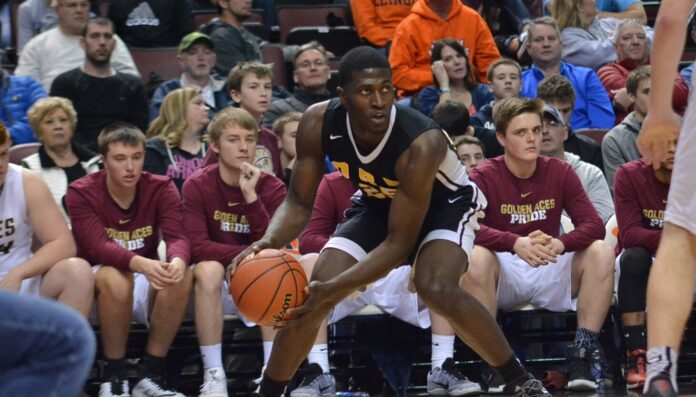It gets to a point where you don’t want to repeat-write about a different circumstance but a very similar theme. Basketball and bullets. The two always seem to find one another, no matter how far, distant, obscure or painful the reach.
The story of Raekwon Drake is rare but not drastically dissimilar to the stories of so many others who’ve been raised on these Chicago concrete magnets that hold us in ways a quantum entanglement physicist couldn’t even figure out. A young brotha who did everything he could to detach himself from the pull of the blocks that surrounded his upbringing. One of many who used basketball as his pre-RIP resurrection.
The paradox of how the former Orr star and two-time state champion ended up being convicted in July of second-degree murder — down from the first-degree murder he originally was charged with in 2021) and sentenced Dec. 3 to an additional 14 years (on top of three already served in the Cook County Department of Corrections) is just the most recent example of Chicago basketball’s too-personal relationship with guns.
In Drake’s case, that relationship forced him to run into his apartment to get his gun after some dudes tried to rob him and stole his $4,000 French bulldog. He emerged back out of the apartment in full attack mode with his 9mm to get his dog back, chasing down the robber who had thrown the dog to the ground to escape. After the ensuing scuffle, the assailant, Martin Palafox, was lying on the ground face-down, hands up. As assistant state’s attorney Jennifer Cooper said in court, Drake then “put the gun to the back of [Palafox’s] head, looked around and he pulled the trigger.”
The “Shoot hoops, not guns” mantra meant nothing in that moment. Never does. Just another end to one Black man’s life and a gateway to the end of another’s over some dumb s–t. The same dumb s—t that usually is the main character in these stories, that reared itself in the Story of Benji (Wilson), that popped up in the Story of DeDe (Rainey), that famously ended the Story of Malcolm Jamar Stuckey. The Story of Maurice Davis, Englewood’s finest.
There’s a connecting of dots between Drake’s story and the survival of former DePaul Prep and De La Salle players TY Johnson and TaKiya “TK” Howard and Marshall coach Shawn Harrington, about whom author Rus Bradburd wrote “All The Dreams We’ve Dreamed: A Story of Hoops and Handguns on Chicago’s West Side.”
There are stories on the other side of the relationship: Danville’s Keon Clark, who, at 38 years old in 2013, after playing for the Suns and the Jazz, found himself in a Colorado courtroom being handed an eight-year prison sentence on weapons and DUI charges. Former Corliss High School and Celtics player Nathan “Grave” Driggers found himself convicted in 2017 of selling stolen guns, reportedly 30 of them. As with Clark, the system got eight years of his life.
Armond Williams comes to mind. The former Sun-Times All-Public League fourth-team player from Austin High School, 2000 state slam-dunk champ, UIC star and 2004 Horizon League Tournament MVP found himself pleading guilty to first-degree murder for shooting the doorman at the Sound-Bar in 2019.
But that’s just Chi. We can go way deeper into the Ja Morant situations and the Gilbert Arenas cases and the Allen Iverson and Rajon Rondo circumstances when it comes to this. Be it victim or victim of circumstance, somehow, someway, they always find each other. The ties that bind. Hoop life. Gun life. Our beautiful, dark, twisted basketball tragedy.
For Raekwon Drake, its harrowing. Stark. For his victim, it’s sorrowing. Dark. In Drake’s case, everything he has learned and been taught and experienced, everything the game give him, is now gone. Even as basketball really had nothing to do with what happened in that moment, it, the game — like with so many of us — seemed to be Drake’s life, his incomplete story, making everything that happened, sadly, a part of our lives.
And often our deaths.
“I just want to say . . . I’ve never been trouble,” Drake told the judge at his sentencing. “I have been going on, playing basketball because that was the only way out for me.”
Somehow that didn’t work. Somehow that wasn’t enough.
We are told that if you let it, if you follow its lead, the game of basketball can be your savior. Yet the redemptive power of recidivism only blankets half of this story. The other half, not so much. This isn’t to single Drake or his situation out. This isn’t the highlighting of some cautionary tale that hopefully changes the direction of an ongoing narrative that continues to have one bad ending followed by another, worse ending.
Nope. This is about a relationship, a union of two addictions of Chicago life that unfortunately found one another, keep finding one another and can’t seem to let one another go.
Drake’s lucky. The dead whose lives were basketball but were ended by the bullets that exited a gun can’t ever be reclaimed.
